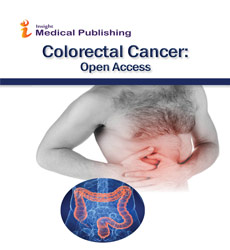Use of Surgery and Chemotherapy In Colon Cancer and Its Stages
Z Xiaohang*
Division of Cancer Epidemiology and Genetics, Cancer Genome Research Laboratory, USA
- *Corresponding Author:
Received: July 09, 2021; Accepted: July 23, 2021; Published: July 30, 2021
Citation: Xiaohang Z (2021) Use of Surgery and Chemotherapy in Colon Cancer and its Stages, Colorec Cancer Vol.7 No.4:6
Introduction
An abnormal growth of tissue called as polyp begins inside the colon or rectum causes the cancer in colorectal which after causes morbidity and mortality. The treatment for this cancer is guided by some principles and stages and histopathology.
Stage Wise Treatments
There are some factors which cause this cancer but it is mainly based on stages for its treatment people with this cancer may not be infected with distant regions and some suggested treatment for this involves either surgery or chemotherapy. This chemotherapy may be done after surgery called adjuvant and most of this treatment is given for about 6 months.
Stage 0
This treatment involves colonoscopy that undergoes removing a part infected in the colon called polyp or removing the part out infected with by local excision. In this stage the cancer is not grown to inner lining in most cases surgery is done to remove the polyp and removing the part is called as partial colectomy.
Stage 1
In this stage the cancer have grown deeper in walls but not outside the colon. If the cancer is more than it is advised to go for surgery if polyp is not removed and it cannot be removed completely because it has to be removed in pieces.
Stage 2
In this stage surgery is done to remove the cancer along with the nearby lymph nodes and in some cases they may come back so doctor will suggest going for chemotherapy after surgery.
Some reasons for coming back include: If the neoplasm is not normal when closely viewed
If the physician not removed the lymph nodes
If the malignant blocked the colon
If the tumour causes hole in the colon
It can come back if some cancer is left at edges
In some times the doctor prefers to go for chemotherapy if it was for specific genes called MSI or MMR. Not all doctors allow for chemotherapy because they may have some side effects so it is better to ask for risk factors and benefits.
Stage 3
In this stage 3 they will not spread to other parts but will spread to lymph nodes in this stage removal of malignant by surgery along with chemotherapy is the treatment for this stage.
Stage 4
In this stage it will spread to other organs tissues mostly for some places like liver, lung, brain and peritoneum and to distant lymph nodes. In some cases surgery itself cannot cure if they are small areas then they can be removed treatment for distant sites include:
• Hepatic artery infusion this treatment is used for liver if the tumour spreads to liver
• Embolization method if the tumours are present in the liver another option to destroy them is ablation.
• Doctor advises to go to chemo and target therapies some of them are
• FOLFOX: leucovorin, 5-FU, and oxaliplatin (Eloxatin)
• FOLFIRI: leucovorin, 5-FU, and irinotecan (Camptosar)
• CAPEOX or CAPOX: capecitabine (Xeloda) and oxaliplatin
• FOLFOXIRI: leucovorin, 5-FU, oxaliplatin, and irinotecan.
Conclusion
People with colon cancer are treated with chemotherapy and surgery and for advanced cancers radiation therapy are also used and immunotherapy drugs are also used.
Conflict of Interest
There is no conflict of intrest.
Open Access Journals
- Aquaculture & Veterinary Science
- Chemistry & Chemical Sciences
- Clinical Sciences
- Engineering
- General Science
- Genetics & Molecular Biology
- Health Care & Nursing
- Immunology & Microbiology
- Materials Science
- Mathematics & Physics
- Medical Sciences
- Neurology & Psychiatry
- Oncology & Cancer Science
- Pharmaceutical Sciences
